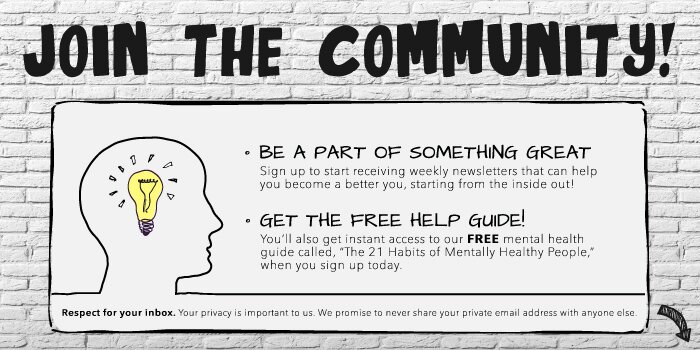10 Ways Music Can Improve Your Mental Health
“Music… will help dissolve your perplexities and purify your character and sensibilities, and in time of care and sorrow, will keep a fountain of joy alive in you.” – Dietrich Bonhoeffer
Have you ever noticed that certain songs have a powerful influence on your mood?
Some make you smile, some make you cry, some make you long for days past – or feel relieved that those days are behind you.
It’s no secret that music has the power to evoke memories, emotions, and associations.
There are reasons this happens, as music therapist Jennifer Buchanan explained in an article for The Huffington Post Canada:
Music quickly taps into our rewards centers in our brain. What happens is for most of us in seconds, we will release hormones into our system, like dopamine, which will help us feel good, oxytocin, which will help us trust people and serotonin, which can help us sleep. It all depends on the tune.
Listening to music and playing instruments allows us to express ourselves, provides a way for us to connect with others, and inspires creative thinking.
In addition, studies have shown links between music and positive improvements in health.
Here’s a list of 10 ways music can improve the quality of our lives.
1) Better sleep. Listening to classical music has been shown to help treat insomnia in college students, making it a safe, cheap alternative to sleep-inducing medication. Several studies have shown that music can cause significant improvements in sleep quality. Tunes with a slow tempo, a steady rhythm, low pitches, and tranquil melodies were used in the studies, but what works for you may vary.
2) Reduced stress. Research has found that listening to music can relieve stress by triggering biochemical stress reducers into action.
3) Decreased anxiety. One study found that music’s effect on anxiety levels is similar to the effect of getting a massage.
4) Reduced pain, anxiety, and depression. Listening to music before, during, or after a surgical procedure can significantly reduce pain and anxiety and decrease the need for pain medication. And, listening to music can be effective for reducing pain in people with high-anxiety who can easily become absorbed in cognitive activities. Another study found that listening to music can reduce chronic pain by up to 21 percent and depression by up to 25 percent and make people feel more in control and less disabled by their condition.
When you’re feeling down, music can help you feel better. Research suggests the kind of music matters: Classical and meditative sounds seem to be particularly uplifting, but heavy metal and techno can actually make depressive symptoms worse.
5) Induce relaxation. Listening to slow musical beats can alter brainwave speed, creating brainwave activity similar to when a person is meditating or is in a hypnotic state. Some research suggests that using rhythmic stimuli can have a therapeutic effect, easing symptoms of migraines, PMS, and even behavioral issues.
6) Improved quality of life. Music and singing can improve quality of life for older people by easing pain, anxiety, and depression. Children who participate in music therapy have significantly improved self-esteem and significantly reduced depression compared with those who received treatment without music therapy.
Making music (singing or playing an instrument) can improve both pro-social behavior and the problem solving skills of young children.
7) Uplifted mood. A 2013 study found that music helps people get in touch with their feelings and puts them in a better mood. Study participants rated “self-awareness” and “arousal and mood regulation” as the two most important benefits of listening to music.
8) Improved cognitive performance. Background music may enhance performance on cognitive tasks (music without lyrics works best). An older study found that test takers who listened to music completed more questions in the time allotted, and got more answers correct. More recent research suggests that whether or not music improves cognitive function depends on whether the music first improves a person’s emotional state.
9) Improved performance in high-pressure situations. One study found that basketball players prone to performing poorly under pressure during games played significantly better during high-pressure free-throw shooting if they listened to catchy, upbeat music and lyrics beforehand.
10) Enhanced physical performance. Costas Karageorghis of Brunel University in London, one of the world’s leading experts on the psychology of exercise music, wrote that one could think of music as “a type of legal performance-enhancing drug.” Listening to music during exercise has been shown to increase endurance, reduce perceived effort, and make working out more enjoyable. Exercise helps you create a more positive self-image, provides a distraction from worries, and facilitates a sense of motivation and positive direction.
Listening to music, singing, and playing instruments can boost your mood, help you relax, promote recovery, and improve your overall well-being, but if you are suffering from chronic anxiety or depression, professional help may be necessary too.
Related Reading:



